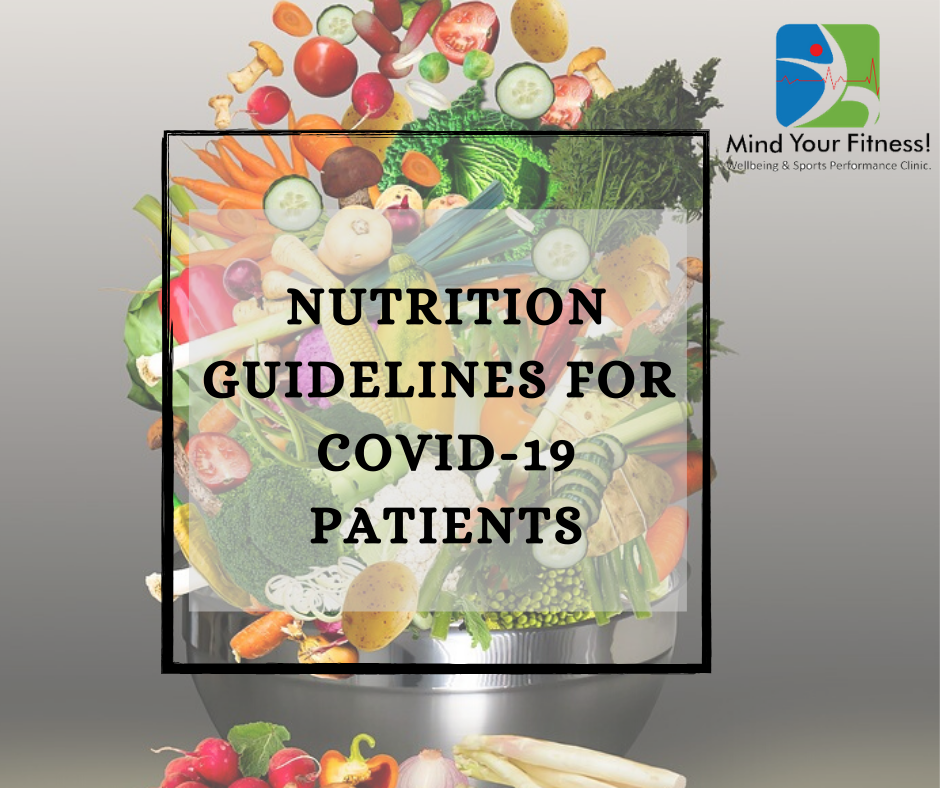
It is evident that people of all ages can become infected: malnourished elderly people, with low immunity and patients with chronic diseases like diabetes have more complications with disease severity.
Good nutrition not only provides the body with immunity to diseases, including COVID-19, but is also the primary guarantee for promoting disease recovery.
Dietary guidelines:
Calories
Adequate calories must be provided depending on the patient’s nutritional status. Malnutrition is defined not only by low body mass but also by inability to preserve healthy body composition (fat: muscle mass). Obesity should be screened and investigated according to the same criteria.
Obesity
Recent reports have suggested that obesity is one of the underlying health conditions that can cause a more severe reaction to COVID-19 infection.
Patients with obesity often have respiratory dysfunction, impaired immune function, increased overall inflammation and low lung volume/muscle strength. These individuals are more prone to pneumonia and cardiac stress. Obesity with diabetes is even more complicated. A planned diet is crucial for recovery ensuring healthy weight loss and maintenance.
Protein
It is indicated as top priority. It is recommended to be at 1.2-1.3 g/kg ideal body weight per day; increasing the supplementation of branched chain amino acids (BCAA) to 50%, to prevent muscle loss and enhance the strength of respiratory muscles. Whey protein is the ideal choice of the budget permits, at least for the first 2-3 weeks. If not, fresh curd, paneer or thoroughly cooked eggs can be given depending upon meal preference and digestive function.
Protein must be individually adjusted with regard to nutritional status, physical activity level, disease status and digestive tolerance.
Carbohydrate
The total must not exceed 150 g per day. The usage of carbohydrates leads to the production of equal carbon dioxide (called respiratory quotient) which must be avoided to decrease the respiratory distress. If the patient is diabetic, he has to be monitored closely for episodes of glucose highs and lows and the medication needs to be adjusted. Persistent high glucose is an effect of infection and can also delay recovery. Opt for pulses, dairy and vegetables over grains. Avoid fruit juices.
Fat
To maintain calories, the proportion of fat can be increased. Give priority to the use of medium chain fatty acids. Also increase the proportion of ω-3 fatty acids and ω-9 fatty acids. Essential fatty acids (ω-3) play a major role in immune responses. They reduce inflammation. Coconut oil, butter, ghee, nuts, MCT oil can be used. Olive oil, rice bran oil, groundnut oil can also be used for cooking.
Micronutrients
Routine supplements of multivitamins and minerals is needed with emphasis on adequate vitamin B/C/D, zinc, and selenium. Iron deficiency anemia should be treated.
Immunonutrients
These nutrients are shown to have a considerable influence on immune function. There are several types of immunonutrients, such as arginine, glutamine etc. Glutamine also supports gut function.
Probiotics
The alteration of healthy gut bacteria is due to the increase of the gut permeability. This occurs as a result of infection and treatment with antibiotics (if prescribed to treat or prevent secondary infections). This drives the inflammation further. Probiotic supplements are able to restore immunity. They need to be prescribed by a doctor.
Fluids and salts
Fever is associated with excess loss of fluids and increased metabolism which can lead to dehydration. Hydration should be maintained with adequate fluids. Thin buttermilk, soups, coconut water (unless there is a potassium restriction), salted lemon water and ORS can be used. For cardiac patients, the volume of fluid and sodium, may have to e restricted. Your physician will advise you on the intake.
Meal frequency and consistency
If the patient’s dry cough and sore throat is severe, solid food intake may decrease. Therefore, warm, soft foods and supplements can be used. Small frequent feeds would be better if the appetite is less, timing of fluid consumption should be in between meals.
ICU patients can have swallowing issues called prolonged post extubation swallowing disorder after discharge. This can last even upto 4 months after and must be supported with alternatives.
Another issue seen in patients is digestion issues and the meal plan must be customised as per symptoms.
Exercise
Prolonged home stay may lead to reducing regular physical activity and hence drop in muscle mass. ICU patients suffer the most muscle loss. Once the patient is stable and the physician gives a clearance, exercise must be encouraged.
Safe, simple, exercises may include, strengthening exercises, activities for balance and control, stretching or a combination of these to maintain fitness, preferably under guidance.
People with COVID-19 may need support with their mental health and diet to ensure they keep in good health. Seek counselling from appropriately trained health care professionals.
Stay strong!
Shweta Bhatia, Registered Dieteitan, Mind Your Fitness!






2 Responses
Great article. Very helpful. Love the descriptor around Carbs and why they should be avoided in excess.
Appreciate you for sharing these wonderful posts. In addition, the ideal travel in addition to medical insurance plan can often reduce those issues that come with vacationing abroad. The medical emergency can in the near future become extremely expensive and that’s certain to quickly place a financial burden on the family’s finances. Having in place the ideal travel insurance offer prior to leaving is definitely worth the time and effort. Thanks a lot